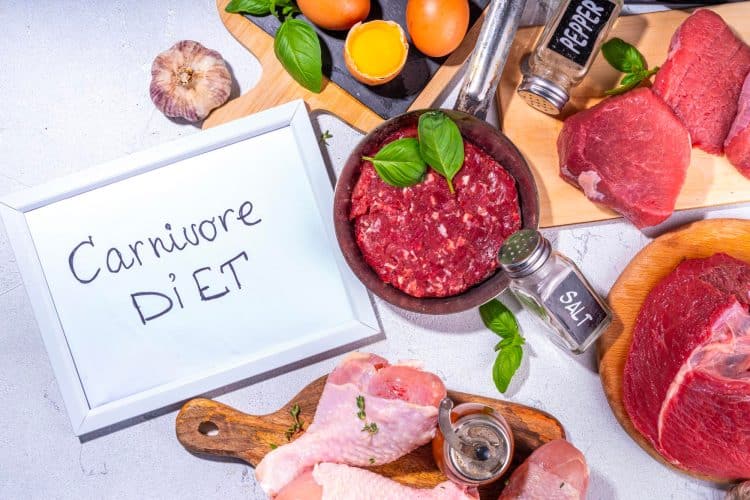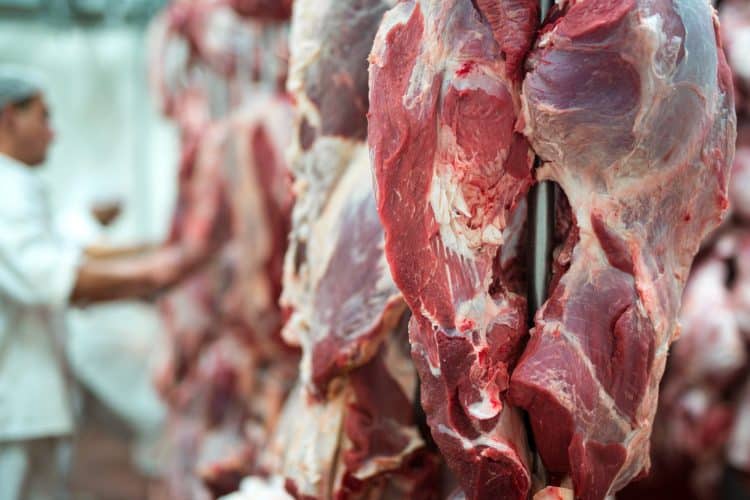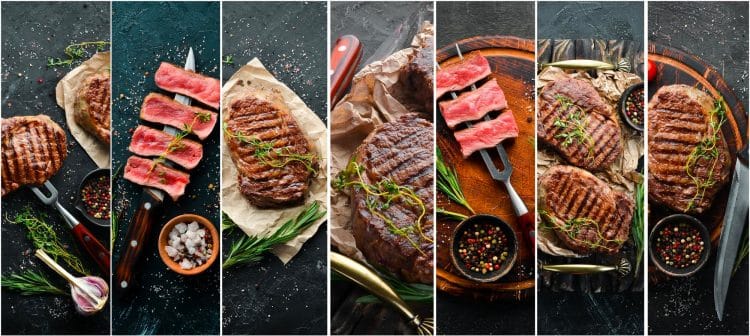There are several extreme diets out there. They often involve eliminating an entire class of macronutrients or food types. Over the last few years, the carnivore (meat-only) diet has been trending worldwide. While many people swear by its ability to promote weight loss and improve digestion and brain power, others decry its avoidance of fruits and vegetables.
This article lays out a complete seven-day carnivore diet meal plan. We’ll also explore the diet’s benefits and potential drawbacks, along with meal planning strategies and tips for adjusting the carnivore diet for specific goals.
Understanding the Carnivore Diet

The carnivore diet, sometimes referred to as the zero-carb diet, involves only eating animal products, such as meat, dairy, and eggs. The diet’s origins can be traced back to 1856 when Bernard Moncriff wrote a book about his experiences of eating only meat and drinking milk for a year. Three decades later, the Salisbury Diet, consisting of 12 weeks of eating nothing but meat and hot water, came into vogue.
In the 1960s, bodybuilding training guru Vince Gironda had his athletes use a steak and eggs diet. This diet was supposed to be the secret that got Vince’s athletes so ripped. Then, in 2018 orthopedic surgeon Shawn Baker wrote a book called The Carnivore Diet. The diet soon became a viral sensation. Several well-known figures, including Jordan Peterson, became vocal advocates of the diet.
Baker points out that a meat-only diet was the norm for humans for nearly two million years. Only in the last 10,000 years did we begin growing crops. When that change was introduced, according to The Carnivore Diet, humankind experienced an explosion in diseases, including heart disease, cancer, and osteoporosis. These diseases did not exist when we were solely meat eaters.
The modern-day carnivore diet is designed to reset the metabolism and return to how we have evolved to eat.
Rules of the Carnivore Diet
The carnivore diet is pretty simple and is built upon the following rules:
- Consume fatty meats, mainly from ruminant animals: These animals have a digestive system capable of digesting plant material. Fatty meats are extremely nutrient dense.
- Fat should be your primary energy source: Get your fats from meats like ribeye steak, pork belly, chicken wings, and rack of lamb. You should also consume fatty fish such as mackerel, king salmon, and arctic char.
- Cut out all plant foods: On this diet, you must eliminate all vegetables, fruits, grains, and legumes. This runs counter to what we are told in mainstream information sources. Yet, research indicates that plant foods may introduce toxic doses of carbohydrates, bacteria, and toxins into the body. [1] [2] [3]
- Remove nuts and seeds: That means no walnuts, almonds, pistachios, flax seeds, or peanuts. Nuts contain antinutrients such as phytic acid and lectins, which may interfere with nutrient absorption and lead to digestive problems.
- No alcohol: Because alcohol is made from fermented fruits and grains, it is forbidden on the carnivore diet. Alcohol also hurts fat digestion and dehydrates the body.
Related: Find Your Daily Protein Intake
Carnivore Diet + Intermittent Fasting

Intermittent fasting essentially boils down to timing your food intake so that you have an extended non-eating (or fasting) window each day. This promotes fat loss by depleting glycogen levels and forcing the body to turn to stored body fat for energy.
There are many ways to do intermittent fasting. One of the most popular is the 16/8 diet, where you fast for 16 out of every 24 hours. This is the version I follow. I stop eating at 7 pm and then fast until 11 am the following day. I then eat two meals during the eight hours between 11 am and 7 pm.
Intermittent fasting mimics how our ancestors would have eaten in the wild hundreds of thousands of years ago. They didn’t have access to food every couple of hours, so they went for long periods without food. And when they did find food, it was animal-based. As a result, intermittent fasting and the carnivore diet are a natural fit.
According to the 2020 Harvard Carnivore Diet Study, 83% of the 2029 carnivore dieters studied were following some type of intermittent fasting (IF) plan. For many, this was more because the fatty meat meals they ate were so filling than being a conscious decision to do IF. The health benefits reported in this study were nothing short of astounding.
Here are some highlights:
- 93% experienced significant weight loss
- 100% of people with diabetes came off their injectable medication
- 97% reported improvements with gastrointestinal problems [4]
The combination of intermittent fasting and the carnivore diet has also been shown to improve inflammation dramatically. Inflammation is associated with a high-carb diet, so the low to zero-carb nature of the carnivore diet makes it ideal for reducing inflammation. At the same time, intermittent fasting has been shown to reduce the markers of inflammation. [5]
Another benefit of combining the carnivore diet with intermittent fasting is improving gut health. The combination encourages the breakdown of fatty acids into ketones. These ketones help restore the intestine lining, promoting intestinal permeability. [6]
Related: Learn All About Intermittent Fasting
Benefits of the Carnivore Diet
The carnivore diet is a pretty radical departure from the conventional way of eating. Fortunately, there are some compelling reasons to follow it. Here are the top five:
1. Improved Digestion
At face value, the carnivore diet may appear terrible for your digestion. After all, we’ve been told that fiber is essential for digestive health, and the carnivore diet eliminates all fiber. Contrary to popular belief, though, fiber does not improve your digestion. It may help you go to the bathroom more frequently but can also cause bloating and stomach cramps.
A carnivore diet eliminates several trigger foods that can cause digestive issues, including grains, legumes, dairy, and certain vegetables. You will also be cutting out nutrients like lectins and phytates, which can irritate the gut lining. Instead, you will be filling up on animal-based proteins, which are far easier for the gut to digest than plant-based proteins.
The high levels of animal fats in the carnivore diet also stimulate the release of bile in the stomach. This improves the digestion of fat-soluble vitamins.

2. Helps Relieve Autoimmune Diseases
More than a hundred types of autoimmune disorders affect everything from the brain to the thyroid to the muscles. They are primarily caused by inflammatory foods that permeate the modern Western diet. These include soy, grains, and refined sugars. When you go on a carnivore diet, you cut these foods out, with immediate benefits to your autoimmune system.
The low carbohydrate intake on the carnivore diet also reduces inflammation levels, helping offset autoimmune problems. The nutrient density of the animal-based foods that are the focus of the carnivore diet also supports the immune system and improves autoimmune symptoms.
3. Improves Mental Health
The billions of neurotransmitters in our brains allow us to experience our memories, thoughts, and emotions. When they are out of balance, we can experience a wide range of issues, such as sadness and anxiety disorders. Eating meat frequently contributes to maintaining the equilibrium and health of your neurotransmitters, which elevates mood and enhances cognitive performance.
One study published in the International Journal of Behavioural Nutrition and Physical Activity found a correlation between eating meat less frequently than three times per week and a higher risk of mental health problems like anxiety and depression. [7]
Low-level meat eaters have been shown to produce lower levels of dopamine, the hormone that gives you a sensation of pleasure and well-being. Serotonin levels, a neurotransmitter that makes you feel calm and relaxed, are also reduced. Tyrosine and tryptophan, two amino acids abundant in meats, are used to make both hormones. According to a study in the Journal of Affective Disorders, meat eaters are 18% less likely to experience depression than vegetarians or vegans. [8]
4. Cardiovascular Health
Health organizations frequently advise people to decrease their meat intake to reduce the risk of developing cardiovascular disease. They draw attention to the fact that animal products generally include high levels of cholesterol and saturated fat, both of which have been linked to an increase in cardiovascular illness. According to conventional knowledge, eggs shouldn’t be consumed excessively because of their high cholesterol level. Similarly, excessive consumption of hamburgers and steaks has been advised against for the same reason.
Today, though, many medical professionals are changing their minds on this subject. We are discovering that meals high in cholesterol, such as eggs, red meat, and others, don’t necessarily lead to bad health. The real bad guys are trans fats, sugar, and carbs. The body needs cholesterol to function. It is a crucial part of cell membranes and is utilized to produce crucial compounds like hormones, fat-soluble vitamins, and bile acids that aid food digestion.
Additionally, considerably more cholesterol than you may consume through meat is naturally produced by the body. Therefore, eliminating foods high in cholesterol won’t significantly impact your blood cholesterol levels.
5. Weight Loss

Weight management is among the most popular reasons for adopting a carnivore diet. It works for weight loss by limiting a person’s intake of carbohydrates, putting their body into ketosis, which is very similar to the ketogenic diet.
The body produces “ketones” while in ketosis, forcing it to use fat as fuel rather than glucose, which results in weight reduction. The carnivore diet is actually a stricter version of carb restriction than keto. It is more restrictive in terms of what foods are permitted. The carnivore diet involves consuming no carbohydrates, while the ketogenic diet permits a small amount.
Numerous studies have closely examined the effectiveness of the low-fat, restricted-calorie diet, the Mediterranean restricted-calorie diet, and the low-carb non-restricted-calorie diet. The outcomes were astounding. The low-carb non-restricted calorie diet produced the best benefits after two years in 95.4 percent of the study participants. [9]
Many theories exist as to why this is effective. According to one idea, meat tends to be more satiating, so even though you can consume more calories (non-restrictive), you inevitably eat less of it. In essence, you eat fewer calories because you feel full faster, which will help you manage your weight better.
Foods You Can Eat on the Carnivore Diet

Here are the foods you can eat on the meat-only diet:
- Organ meats
- Poultry
- Fish
- Meat
- Eggs
- Lard
- Bone marrow
- Butter
- Salt and pepper
- Milk
- Yogurt
- Cheese
Beverages You Can Drink on the Carnivore Diet
You must stick to the following liquids on the carnivore diet:
- Water
- Coffee (unsweetened and black)
- Tea (unsweetened)
Foods That Are Not Allowed on the Carnivore Diet
Steer clear of these foods on a carnivore diet:
- Vegetables
- Fruit
- Seeds
- Nuts
- Legumes
- Bread
- Pasta
- Grains
Easing Into the Carnivore Diet
It is a good idea to transition gradually into the carnivore diet. A radical transition can be challenging, both nutritionally and psychologically. There is no need to give up all your favorite foods overnight.
Making one meal of the day a complete carnivore meal is an excellent place to start, and after you get used to it, you can move on to the next. Breakfast is one of the simplest meals to begin with. A quick and simple option would be some bacon or baked salmon. Replacing each element of a meal one at a time is an additional strategy for easing into the diet. For example, you can start by substituting more eggs for the toast in a meal of eggs, bacon, toast, cereal, and juice. The next day, you might have an extra slice of bacon in place of your cereal.
Then swap out the fruit the following day.
Nothing is wrong with completely giving up all non-meat foods, but just like quitting smoking, it is not something everyone can handle. Experiment to find a strategy that works best for you.
Sample Carnivore Diet Meal Plan

The following seven-day meal plan is designed for a person with a TDEE of 2,100 calories. To lose fat, reduce the daily calories by 210-315. To gain muscle, increase by the same amount.
Monday
Meal 1: 9 oz Ribeye Steak
- Calories: 800
- Carbs: 0g
- Protein: 60g
- Fat: 60g
Meal 2: Three Chicken Thighs
- Calories: 600
- Carbs: 0g
- Protein: 50g
- Fat: 45g
Meal 3: 9 oz Ground Beef
- Calories: 700
- Carbs: 0g
- Protein: 60g
- Fat: 50g
Total Daily Nutrition:
- Calories: 2,100
- Carbs: 0g
- Protein: 170g
- Fat: 155g
Tuesday
Meal 1: Bacon (2 rashers) and Eggs (3)
- Calories: 600
- Carbs: 1g
- Protein: 20g
- Fat: 55g
Meal 2: 9 oz Pork Chops
- Calories: 700
- Carbs: 0g
- Protein: 55g
- Fat: 50g
Meal 3: 9 oz Salmon Filet
- Calories: 600
- Carbs: 0g
- Protein: 50g
- Fat: 45g
Total Daily Nutrition:
- Calories: 1,900
- Carbs: 1g
- Protein: 125g
- Fat: 150g
Wednesday
Meal 1: 9 oz T-bone Steak
- Calories: 900
- Carbs: 0g
- Protein: 70g
- Fat: 70g
Meal 2: 9 oz Lamb Chops
- Calories: 800
- Carbs: 0g
- Protein: 60g
- Fat: 60g
Meal 3: 9 oz Shrimp
- Calories: 400
- Carbs: 0g
- Protein: 80g
- Fat: 8g
Total Daily Nutrition:
- Calories: 2,100
- Carbs: 0g
- Protein: 210g
- Fat: 138g
Thursday
Meal 1: 9 oz Beef Ribs
- Calories: 900
- Carbs: 0g
- Protein: 60g
- Fat: 70g
Meal 2: 9 oz Duck Breast
- Calories: 600
- Carbs: 0g
- Protein: 45g
- Fat: 45g
Meal 3: 9 oz Ground Turkey
- Calories: 700
- Carbs: 0g
- Protein: 60g
- Fat: 50g
Total Daily Nutrition:
- Calories: 2,200
- Carbs: 0g
- Protein: 165g
- Fat: 165g
Friday
Meal 1: 9 oz Sirloin Steak
- Calories: 800
- Carbs: 0g
- Protein: 60g
- Fat: 60g
Meal 2: Three Chicken Wings
- Calories: 600
- Carbs: 0g
- Protein: 50g
- Fat: 45g
Meal 3: 9 oz Bison Burger
- Calories: 700
- Carbs: 0g
- Protein: 60g
- Fat: 50g
Total Daily Nutrition:
- Calories: 2,100
- Carbs: 0
- Protein: 170 g
- Fat: 155 g
Saturday
Meal 1: 9 oz Ribeye Steak
- Calories: 800
- Carbs: 0g
- Protein: 60g
- Fat: 60g
Meal 2: 9 oz Ground Turkey
- Calories: 700
- Carbs: 0g
- Protein: 60g
- Fat: 50g
Meal 3: 9 oz Salmon Filet
- Calories: 600
- Carbs: 0g
- Protein: 50g
- Fat: 45g
Total Daily Nutrition:
- Calories: 2,100
- Carbs: 0
- Protein: 170 g
- Fat: 155 g
Sunday
Meal 1: 9 oz T-bone Steak
- Calories: 900
- Carbs: 0g
- Protein: 70g
- Fat: 70g
Meal 2: 9 oz Pork Chops
- Calories: 700
- Carbs: 0g
- Protein: 55g
- Fat: 50g
Meal 3: 9 oz Ground Beef
- Calories: 700
- Carbs: 0g
- Protein: 60g
- Fat: 50g
Total Daily Nutrition:
- Calories: 2,300
- Carbs: 0g
- Protein: 185g
- Fat: 170g
Carnivore Diet Calories and Macros

Regardless of what type of diet plan you are following, the basic principle of calorie equilibrium applies. If you eat more calories than your body burns off, you will gain weight; if you consume fewer calories, you will lose weight. To maintain weight, you should eat the same calories your body needs for daily energy.
The first step is determining how many calories your body needs daily. This is called your Total Daily Energy Expenditure (TDEE). You can work out your TDEE with this online calculator.
My TDEE is 2,713. So, to maintain my current weight, I need to shoot for an average of 2,700 calories per day. I need to eat 10-15% fewer calories to lose weight. This will create a caloric deficit, forcing my body to turn to stored body fat to meet the extra energy demand. That means I should eat between 2,430-2,295 calories for weight loss.
Combine a 10-15% caloric surplus with strength training to gain lean muscle mass. For me, that would work out to be 2,970-3,105 calories per day.
When it comes to your macros, protein is the most important. That’s because your carbohydrate intake will be zero. Studies suggest that the ideal protein intake to maintain or build muscle is between .7 and 1 gram per pound of body weight. [10]
I weigh 200 pounds, so my daily protein intake should be between 150 and 200 grams. If my goal were to lose or maintain my weight, I’d keep it at the lower end of that range, and if I were in a bulking phase, I’d set my goal at around 200 grams of protein each day. The remainder of my daily calories will come from fats.
Addressing Potential Concerns and Criticisms
The idea of cutting fruits and vegetables from their diet is alarming to most people. So, let’s address some common concerns and criticisms surrounding the carnivore diet to see if we can set matters straight.
Increased Cholesterol Levels
There is no denying that meat has a high saturated fat and cholesterol content. This causes the liver to create more cholesterol than the body requires for normal function. For example, a 3-ounce serving of prime rib comprises roughly 75 milligrams of cholesterol and 14 grams of fat, six of which are just saturated fat. That’s more than the American Heart Association’s daily recommended cholesterol intake.
But is high cholesterol necessarily a bad thing? Recent research has been challenging long-held assumptions. In a 2017 meta-study that included 68,000 patients, academics and cardiologists from 17 nations examined 19 heart disease studies. They discovered no connection between high LDL cholesterol and heart disease; evidence suggests people with higher cholesterol levels lived longer. [11]
One of the authors of the study, cardiologist Dr. Aseem Malhotra, commented: “The scientific evidence clearly reveals that we must stop fear-mongering when it comes to cholesterol and heart disease and focus instead on insulin resistance, the most important risk factor as a precursor to many chronic diseases.”
Insulin resistance is caused not by meat but by sugar and grains.
High Mercury Levels
There are some concerns about an unhealthy mercury intake resulting from eating a lot of fish on the carnivore diet. A healthy diet should include fish, which is rich in omega-3 fatty acids, high-quality protein, and other necessary nutrients. However, traces of mercury are present in practically every fish and shellfish. In general, eating fish does not provide a significant health risk for mercury poisoning. However, if consumed in large quantities, some fish and shellfish have greater mercury concentrations that could be harmful.
Avoid eating shark, swordfish, king mackerel, or tilefish whenever possible. Instead, choose seafood that has been shown to contain the least mercury, such as shrimp, canned light tuna, salmon, pollock, and catfish.
High Nitrate Levels
Processed meats like bacon, ham, sausages, and hot dogs usually have added nitrates. They serve as preservatives, helping in the reduction of dangerous bacterial growth. However, there is some proof that nitrites can harm cells and change into cancer-causing chemicals. The simplest way to avoid this issue is to reduce your intake of foods like smoked bacon, sausages, cold cuts, salami, jerky, and hams. Replace them with fresh meat on the bone.
Carnivore Diet Supplements
A carnivore diet that includes dairy and eggs covers your nutritional needs well. However, you can plug a few potential gaps with supplementation. I recommend three supplements:
Magnesium
Magnesium, which is primarily sourced from vegetables, nuts, and legumes, is critical for many bodily functions. To ensure you’re getting an adequate magnesium supply on the carnivore diet, consider taking 450 mg of magnesium citrate daily.
Vitamin C
Vitamin C is well known for its immunity-boosting properties. Because it is mainly found in citrus fruits, you will struggle to get enough of it on the carnivore diet. Therefore, we recommend supplementing with 500 mg of vitamin C daily.
Multivitamin
Taking a daily multivitamin is a smart insurance policy that will ensure that you’re getting adequate amounts of vitamins A, D, E, and K, all of which may be low when you’re only eating meat. Check that the multivitamin contains 100% of RDA’s essential vitamins and minerals.
FAQs
Is coffee allowed on a carnivore diet?
Technically. Coffee is not allowed on the carnivore diet. That’s because it is derived from plant-based products. However, many people on the carnivore diet make an exception in this case due to the proven health benefits that come with drinking coffee. Coffee is also low in carbohydrates and calories. Obviously, you cannot add sugar to your coffee on the carnivore diet. At the end of the day, it comes down to personal preference in terms of consuming coffee on the carnivore diet.
Do you have to eat organ meats on the carnivore diet?
No, eating organ meats is not mandatory on the carnivore diet. They are, however, encouraged due to their nutrient density and health benefits. Micronutrients are abundant in organ meats. They are especially plentiful in B vitamins, which promote energy. Including them in your diet will positively impact your overall health and give you more energy.
Organ meats also contain a lot of protein. Leucine, the most vital of the three branch-chain amino acids, is highly abundant in them. Leucine promotes protein synthesis, which is where muscle growth begins. The protein in organ meats is very bioavailable, meaning it will get into your muscle cells faster to promote protein synthesis.
Should I increase my electrolyte intake on the carnivore diet?
Yes, you should try to get extra electrolytes when on the carnivore diet. Electrolyte levels can run low on a low-carb diet like the carnivore diet. Low carbohydrate diets result in significantly less insulin release. Water leaves the body when insulin levels are low. You’ll lose electrolytes like magnesium, potassium, sodium, and water. This can leave you feeling lethargic.
I recommend salting your meats with Himalayan pink salt to prevent electrolyte loss while following the carnivore diet.
How strict should I be about cutting carbs when building muscle on a carnivore diet?
The keto diet is not the same as the carnivore diet. You will still be quite stringent about cutting carbs on a carnivore diet while trying to lose weight. However, you can relax some of your restrictions if you want to gain muscle bulk.
Carbs are necessary for muscular growth.
Your energy requirements on a carnivorous diet will be satisfied by fat. Your intake of carbohydrates will result in a favorable insulin response that will encourage protein synthesis. Additionally, it will improve your anabolic hormone response.
Eat a different amount of carbohydrates before and after working out. Consuming some carbohydrates before working out will also increase the intensity of your workouts. Consuming carbohydrates after exercise will refill glycogen reserves and hasten your recovery.
It will require some work to add extra carbohydrates to the carnivorous diet. Goat yogurt and honey are two carbohydrates that are suitable for carnivorous diets. Aim for about 100 grams of carbohydrates per day.
Conclusion
The carnivore diet isn’t for everybody. But the only way to know if it’s for you is to try it. The seven-day meal plan provided here gives you an excellent introduction to the diet. Simply repeat it for four weeks, then assess your results in terms of how you feel and how much you weigh. If you feel the need, reintroduce fruits and vegetables for a time before returning to a strict meat-only diet.
References
- Ames BN, Profet M, Gold LS. Dietary pesticides (99.99% all natural). Proc Natl Acad Sci U S A. 1990 Oct;87(19):7777-81. doi: 10.1073/pnas.87.19.7777. PMID: 2217210; PMCID: PMC54831.
- Al-Kharousi ZS, Guizani N, Al-Sadi AM, Al-Bulushi IM, Shaharoona B. Hiding in Fresh Fruits and Vegetables: Opportunistic Pathogens May Cross Geographical Barriers. Int J Microbiol. 2016;2016:4292417. doi: 10.1155/2016/4292417. Epub 2016 Feb 16. PMID: 26989419; PMCID: PMC4772400.
- Falomir MP, Rico H, Gozalbo D. Enterobacter and Klebsiella species isolated from fresh vegetables marketed in Valencia (Spain) and their clinically relevant resistances to chemotherapeutic agents. Foodborne Pathog Dis. 2013 Dec;10(12):1002-7. doi: 10.1089/fpd.2013.1552. Epub 2013 Aug 27. PMID: 23980710.
- Lennerz BS, Mey JT, Henn OH, Ludwig DS. Behavioral Characteristics and Self-Reported Health Status among 2029 Adults Consuming a “Carnivore Diet”. Curr Dev Nutr. 2021 Nov 2;5(12):nzab133. doi: 10.1093/cdn/nzab133. PMID: 34934897; PMCID: PMC8684475.
- Aeberli I, Gerber PA, Hochuli M, Kohler S, Haile SR, Gouni-Berthold I, Berthold HK, Spinas GA, Berneis K. Low to moderate sugar-sweetened beverage consumption impairs glucose and lipid metabolism and promotes inflammation in healthy young men: a randomized controlled trial. Am J Clin Nutr. 2011 Aug;94(2):479-85. doi: 10.3945/ajcn.111.013540. Epub 2011 Jun 15. PMID: 21677052.
- Mihaylova MM, Cheng CW, Cao AQ, Tripathi S, Mana MD, Bauer-Rowe KE, Abu-Remaileh M, Clavain L, Erdemir A, Lewis CA, Freinkman E, Dickey AS, La Spada AR, Huang Y, Bell GW, Deshpande V, Carmeliet P, Katajisto P, Sabatini DM, Yilmaz ÖH. Fasting Activates Fatty Acid Oxidation to Enhance Intestinal Stem Cell Function during Homeostasis and Aging. Cell Stem Cell. 2018 May 3;22(5):769-778.e4. doi: 10.1016/j.stem.2018.04.001. PMID: 29727683; PMCID: PMC5940005.
- Dobersek U, Wy G, Adkins J, Altmeyer S, Krout K, Lavie CJ, Archer E. Meat and mental health: a systematic review of meat abstention and depression, anxiety, and related phenomena. Crit Rev Food Sci Nutr. 2021;61(4):622-635. doi: 10.1080/10408398.2020.1741505. Epub 2020 Apr 20. PMID: 32308009.
- Kohl IS, Luft VC, Patrão AL, Molina MDCB, Nunes MAA, Schmidt MI. Association between meatless diet and depressive episodes: A cross-sectional analysis of baseline data from the longitudinal study of adult health (ELSA-Brasil). J Affect Disord. 2023 Jan 1;320:48-56. doi: 10.1016/j.jad.2022.09.059. Epub 2022 Sep 23. PMID: 36162679.
- Shai I, Schwarzfuchs D, Henkin Y, Shahar DR, Witkow S, Greenberg I, Golan R, Fraser D, Bolotin A, Vardi H, Tangi-Rozental O, Zuk-Ramot R, Sarusi B, Brickner D, Schwartz Z, Sheiner E, Marko R, Katorza E, Thiery J, Fiedler GM, Blüher M, Stumvoll M, Stampfer MJ; Dietary Intervention Randomized Controlled Trial (DIRECT) Group. Weight loss with a low-carbohydrate, Mediterranean, or low-fat diet. N Engl J Med. 2008 Jul 17;359(3):229-41. doi: 10.1056/NEJMoa0708681. Erratum in: N Engl J Med. 2009 Dec 31;361(27):2681. PMID: 18635428.
- Morton RW, Murphy KT, McKellar SR, Schoenfeld BJ, Henselmans M, Helms E, Aragon AA, Devries MC, Banfield L, Krieger JW, Phillips SM. A systematic review, meta-analysis and meta-regression of the effect of protein supplementation on resistance training-induced gains in muscle mass and strength in healthy adults. Br J Sports Med. 2018 Mar;52(6):376-384. doi: 10.1136/bjsports-2017-097608. Epub 2017 Jul 11. Erratum in: Br J Sports Med. 2020 Oct;54(19):e7. PMID: 28698222; PMCID: PMC5867436.
- Ravnskov U, de Lorgeril M, Diamond DM, Hama R, Hamazaki T, Hammarskjöld B, Hynes N, Kendrick M, Langsjoen PH, Mascitelli L, McCully KS, Okuyama H, Rosch PJ, Schersten T, Sultan S, Sundberg R. LDL-C does not cause cardiovascular disease: a comprehensive review of the current literature. Expert Rev Clin Pharmacol. 2018 Oct;11(10):959-970. doi: 10.1080/17512433.2018.1519391. Epub 2018 Oct 11. PMID: 30198808.
